Text
Part 15 Reading erha 二哈和他的白猫师尊 + learning Chinese
🍂🍄 I'm back hello! 🍄🍂
I am too nervous to start writing in my brand new Tian Zi ge book- like it's been 10 days and I am adamant about finishing my lined notebook a bit more T_T
ALSO, guys. Guys! I made wanton soup! I bought all the ingredients and here's the result aaah it was so tasty <3

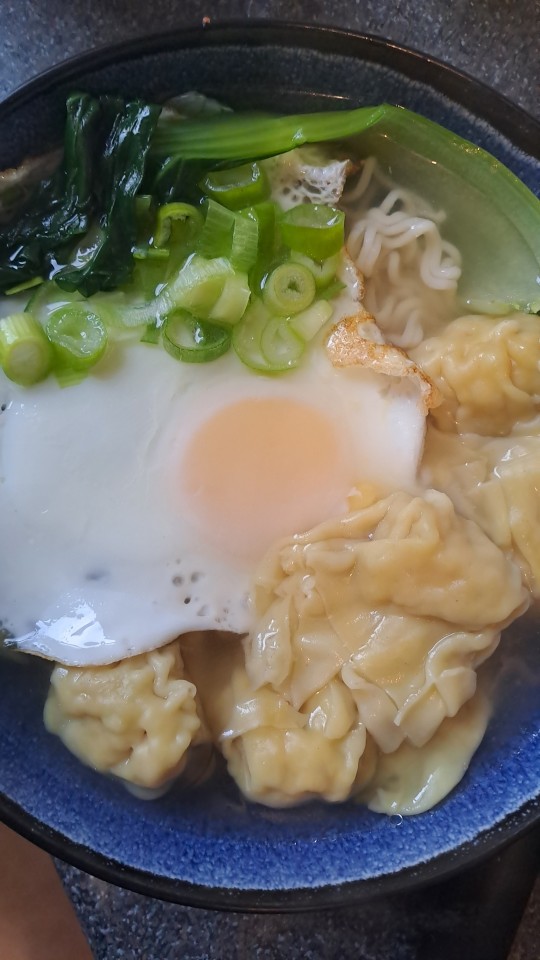
Important question: how do you spell wonton usually? I have found three versions on different packets- wonton, wanton and wantan lol
Ok ok back to the translation!
BOOK TAGS: Xianxia, Rebirth, Action, Conspiracy, Angst, NSFW, 1?v1 HE
WARNING: Suicude
•───────•°•❀•°•───────•
(part 1) 他什么都玩腻了,觉得乏味且孤单,这些年身边熟悉的人越来越少,(part 2) 连 "三把火" 都狗命归天了,他觉得也差不多了,是该结束了。
People he knew by his side; even that three flames dog had passed to the heavens. It was time, he thought. Time to end everything.
•───────•°•❀•°•───────•
1. 连 - even - lián "三把火" - "Three Fires" (a reference to someone's nickname) - "sān bǎ huǒ"
2. 归天了 - died (literally: gone to heaven) - guī tiān le
3. 差不多了 - about the same/almost there - chà bùduō le
差不多 (chà bùduō) means "about the same" or "almost." 了 (le) here indicates a change in situation or state. The phrase 也差不多了 suggests that things are almost at a certain point, possibly in the context of the person feeling that things are coming to an end.
4. 该 - should - gāi
5. 结束 - end, finish - jiéshù
是该结束了 - it's time to end - shì gāi jiéshù le
2 notes
·
View notes
Text
Part 14 Reading erha 二哈和他的白猫师尊 + learning Chinese
🍋⭐Goodnight blog ⭐🍋
I finally got a Tian Zi Ge notebook!!!! It arrived to my home today and I am so excited to write inside, it has 150 pages so hopefully it lasts a while~ Also I went shopping today and found some TGCF bottles which look gorgeous. Pretty sure they are lime flavour but I will just put everything into one picture to show at the bottom of the blog after my translations for the day :D

(I started a series of characters eating- here is a really bad quality sketch (sorry) of Mo Ran eating a wanton dumpling)
BOOK TAGS: Xianxia, Rebirth, Action, Conspiracy, Angst, NSFW, 1?v1 HE
WARNINGS: Suicide
•───────•°•❀•°•───────•
(part 1) 他什么都玩腻了,觉得乏味且孤单,这些年身边熟悉的人越来越少,(part 2) 连 "三把火" 都狗命归天了,他觉得也差不多了,是该结束了。
He'd played with everything and had gotten tired of it. Everything was tasteless and lonely, and in recent years, there were less and less
•───────•°•❀•°•───────•
什么都 - everything - shénme dōu
2. 玩 - play - wán
3. 腻 - tired of - nì
4. 觉得 - to think - juéde
5. 乏味 - boring - fáwèi
6. 且 - and - qiě
且 more formal and literary, often used in written language, classical texts, and formal documents, can also carry the meaning of "moreover" or "furthermore."
和 more common, in everyday conversation, connect in a list expressing simple relationships between things
7. 孤单 - lonely - gūdān
8. 身边 - by one's side - shēnbiān
9. 熟悉 - familiar - shúxī
10. 越来越少 - fewer and fewer - yuè lái yuè shǎo
越来越 (yuè lái yuè) is a structure used to express "more and more." When combined with an adjective or a verb, it indicates an increasing trend. Here, it's used with 少 (shǎo), which means "few" or "less." So, 越来越少 means "fewer and fewer."

Lime juice bottle covers and my new notebook (the squares are so clear inside and the cover feels velvety 🌸)
4 notes
·
View notes
Text
Part 13 Reading erha 二哈和他的白猫师尊 + learning Chinese
🍚🥟 Hello hello! 🥟🍚
I was cleaning my drawer and found two really cool washi tapes!! One has TGCF main leads and the other has MDZS side character but I totally forgot I had it?? You can see one of them in the picture below, while the other one I'll show tomorrow^^
Let's get back to translating!!
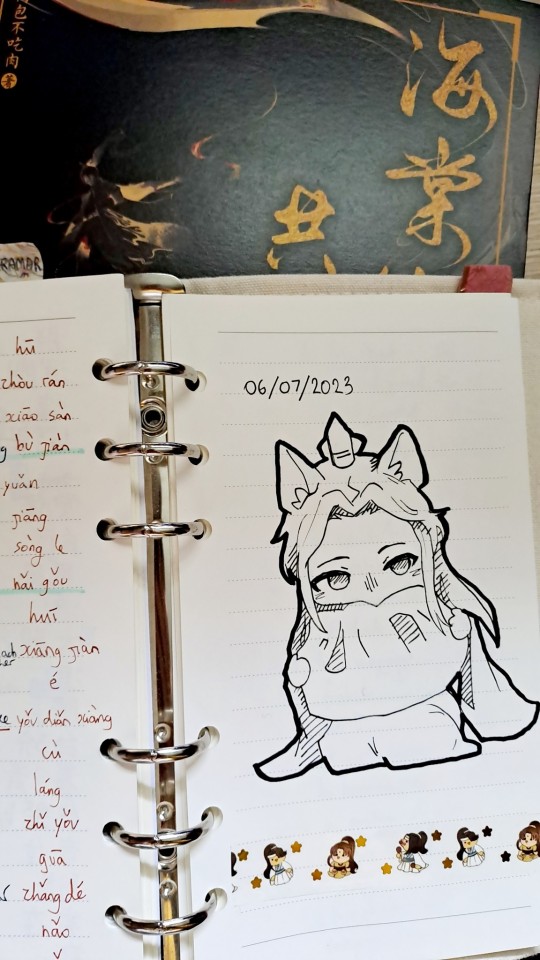
(I did a little Chu Wanning eating wantons doodle)
BOOK TAGS: Xianxia, Rebirth, Action, Conspiracy, Angst, 1?v1 HE
•───────•°•❀•°•───────•
Instead of continuing the text, I would like to analyse the title of the book.
海棠微雨 共归途 (not the erha- title that is more seen now)
•───────•°•❀•°•───────•
For some reason, I got the version called 海棠微雨 共归途 Lovestory of the Prodigal (its title on Amazon) instead of 二哈和他的白猫老师 Dumb Husky and his White Cat Shizun (I think mine is an earlier version before all the huge publication and editing).
Translating the title directly gives something like "Begonia light rain and return home" lol.
A more accurate literal translation correlates to the characters: Haitang and Weiyu On The Way Home Together.
微雨 is Mo Ran’s, that’s the main character’s, courtesy name (Mo Weiyu)
海棠 refers to MC’s master, or shizun, who’s strongly affiliated with this flower. Haitang Blossom (海棠花, Hǎitáng Huā) is a spell, intended for silent communication specifically used by Chu Wanning, named thusly as the message is sent in the form of a Haitang Blossom (Chinese Flowering Crabapple).
Vocabulary:
海棠 - Crabapple - Hǎi Táng
Crabapple (or "Chinese flowering apple" tree) has a different leaf shape to Begonia 🌳. In poetry, it often carries connotations of elegance, beauty, and fleetingness.
In Chinese culture, flowers are considered to have rich cultural and literary connotations. In literary contexts, 海棠 symbolizes homesickness, parting sorrows, and a variety of emotions such as tenderness, beauty, and fleeting happiness.
2. 微雨 - Light Rain - Wēi Yǔ
Rain can symbolize various emotions or situations, such as melancholy, renewal, or transformation.
3. 共 - Together - Gòng
4. 归 - Return - guī
5. 途 - Path/Journey - tú
归途 - Path of Return - Guī Tú
"海棠微雨" has set a poetic scene that could be associated with romantic or emotional moments. 共归途 creates a snapshot of the moment in time when the couple is on their return journey together.
Practice:
Ok so not really practice but AHH exciting news! I finally ordered a Town Zi Ge notebook! It's coming tomorrow so I can finally practice in the squares~
I went for this one in the picture because it had high reviews and alot of pages to last me a while :3 plus the light cover might mean I can doodle or put some stickers on top!!

#chinese#erha#erha he ta de bai mao shizun#grammar#language#linguistics#mo ran#二哈#二哈和他的白猫师尊#fanart#chu wanning
11 notes
·
View notes
Text
Part 12 Reading erha 二哈和他的白猫师尊 + learning Chinese
❄️🌨️ good morning blog 🌨️❄️
I read somewhere that in order to read literature in a new language you should know about 7000 words. Now I knew some up to HSK3 but if we disregard those and only have the ones I learnt in my Tumblr blog, then my 120 ISH words equal %1.71 completion!!! Party time guys :D
If I do roughly 10 words a day, it will be just under 900 days until I learn 7k, which means I can read any literature in about 2.4 years!!! I hyped myself up lol ok let's do this-

(sorry this isn't really related to the book but I wanted to show that recently I'm trying to improve my colouring techniques))
BOOK TAGS: Xianxia, Rebirth, Action, Conspiracy, Angst, 1?v1 HE
•───────•°•❀•°•───────•
墨燃双目合实,复又睁开,他的人生,宠辱跌宕,或起或伏,已有三十二年了。
Mo Ran closed his eyes, then blinked them open. His life was filled with the ebb and flow of prestige and shame, sometimes up, sometimes down. Before he knew it, thirty two years had gone past.
•───────•°•❀•°•───────•
I have discovered something which I need to share before I translate the text. In a previous sentence we learned 一直 and 总是, but what's the difference?
1. “一直(yīzhí)” emphasizes a stable or continuous state.
2. “总是(zǒngshì)” emphasizes a high probability or frequency.
Some examples:
最近几天一直下雨。(Zuìjìnjǐtiānyīzhíxiàyǔ.)
The rain never stopped during the past couple of days.
最近几天总是下雨。(Zuìjìnjǐtiānzǒngshìxiàyǔ.)
It has been raining the past few days. (but there were intervals when it didn’t rain).
他总是对的。(Tāzǒngshìduì de.)
In most cases, he is right. (This doesn’t exclude the cases where he was wrong).
他一直是对的。(Tāyīzhíshìduì de.)
He has always been right and never wrong.
Vocabulary:
1. 双目 - both your eyes (Double Eyes) - shuāng mù
2. 合实 - Closed Tightly - hé shí
3. 复 - Again - fù
4. 睁开 - Opened - zhēng kāi
5. 生 - Life - shēng
宠辱跌宕 (chǒng rǔ diē dàng): This phrase describes the fluctuations and ups and downs in a person's life.
6. 宠 - Favor - chǒng
7. 辱 - Disgrace - rǔ
8. 跌宕 - Fluctuations, Ups and Downs - diē dàng
或起或伏 (huò qǐ huò fú): This phrase means "sometimes rising, sometimes falling" or "alternating between success and failure."
9. 或 - Sometimes, Either - huò
10. 起 - Rise, Start - qǐ
11. 伏 - Fall, Decline - fú
12. 已 - Already - yǐ
Practice:
I have a dirty confession- everything you see highlighted in yellow are words that I don't remember how to say... Basically I forget to learn the pronunciation alongside writing them aaah! But it's ok I have a solution-
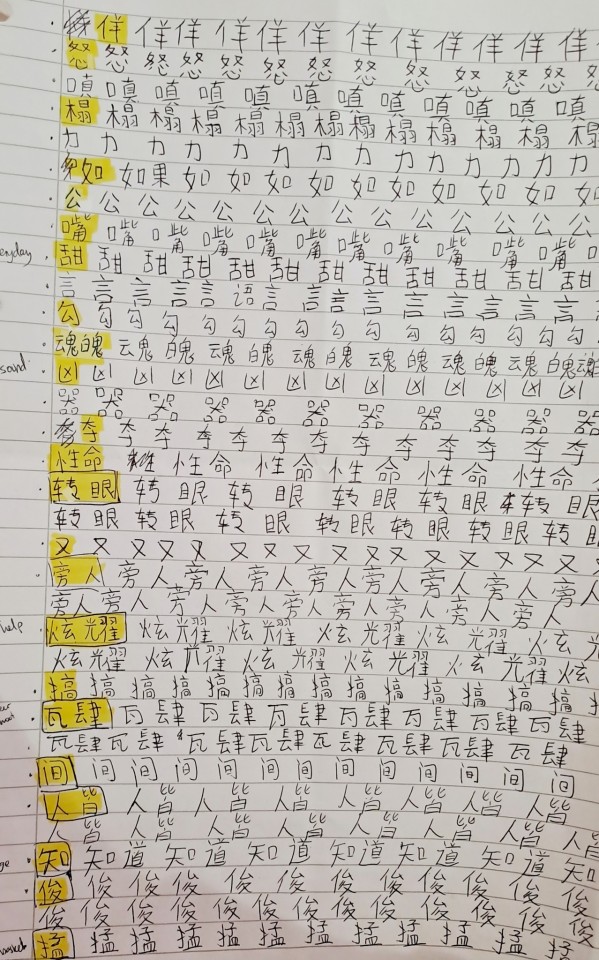
So I know the meaning in English that correlates to the writing in Chinese. Now I just have to put them in flashcards (ikr what an awesome new invention) and memorise on the move. My flashcard app of choice is DuoCards because you get a cute pet mammoth that is happy when you study ☺️

3 notes
·
View notes
Text
Part 11 Reading erha 二哈和他的白猫师尊 + learning Chinese
🎑🍇 Hello blog~🍇🎑
Is it just me or are overly complicated characters fun to write? Once you have memorised them, which yes might take a while, but after that it just feels so cool to write! And I use a method of making association or a little story up to remember them. For example 露 is a cloud of water dripping onto a woman stuck in a flower field. It might be complicated at first but when youre writing it's really fun))
I'm also on a flight back home today so after tonight I'll be back with a lot of translations, don't let this tiny sentence today phase you >:D
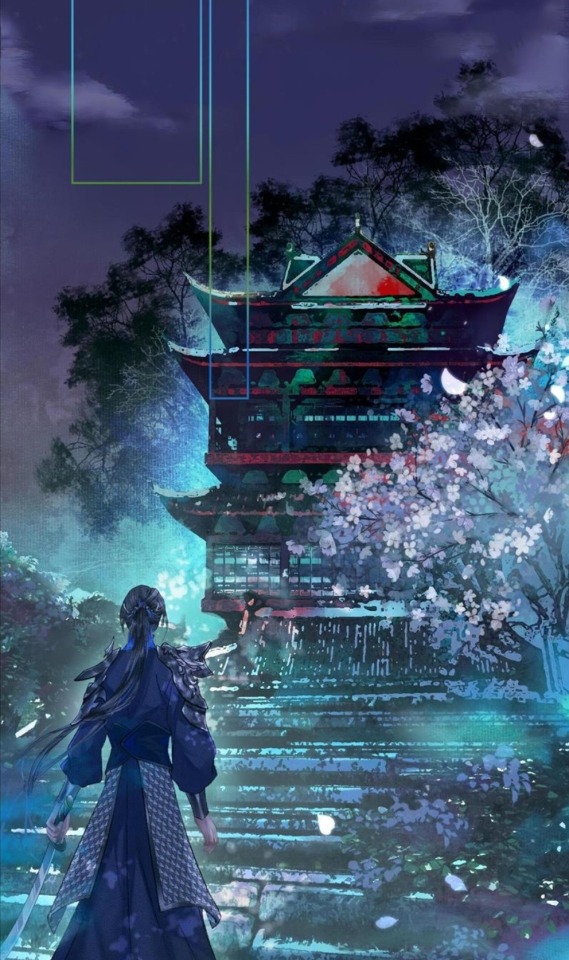
(I had no idea there were already 53 manhua chapters?? And my god look at the art in this what-??!?)
BOOK TAGS: Xianxia, Rebirth, Action, Conspiracy, Angst, 1?v1 HE
•───────•°•❀•°•───────•
奶狗很快长成大狗,大狗成了老狗,老狗又成死狗。
The puppy soon grew up and became a big dog, the big dog became an old dog, and the old dog then became a dead dog.
•───────•°•❀•°•───────•
Vocabulary:
1. 快 - Fast - kuài
2. 长成 - Grow up - zhǎng chéng
3. 死 - Death, to die - sǐ
(Isn't it nice to be able to understand the majority of a sentence, even if it is a simple one?)
Practice:
Just writing new vocab in one notebook to easily see them together.

2 notes
·
View notes
Text
Part 10 Reading erha 二哈和他的白猫师尊 + learning Chinese
☁️🌧️ I've returned fufufu 🌤️☁️
Can I just say, we've learnt 107 words since I started part 1! For someone lazy like me that is impressive in such a short time. As I continue this blog I wish to average 20 new words per post, but for now this is pretty good. I won't compare with other people's speeds, just in my own bubble =w=
Here is a picture from my most recent travels~

"Dracula who? There's a new ruler in this castle." - Taxian-jun probably...
BOOK TAGS: Xianxia, Rebirth, Action, Conspiracy, Angst, 1?v1 HE
Warnings: some swearing
•───────•°•❀•°•───────•
墨燃盯着那空有力气,却着实没脑子的毛团看了须臾,忽然就笑了,一边笑一边低声骂道,狗东西。
Mo Ran stared at the ball of fur who possessed no wits but plenty of energy and suddenly chuckled, laughing as he called it 'Filthy Mut'.
•───────•°•❀•°•───────•
Vocabulary:
1. 盯着 - Staring at - dīngzhe
2. 空 - Empty - kōng
3. 力气 - Strength - lìqì
Specifically human strength. 力 on its own still can mean "strength", even though in written or spoken text it occurs as a bound morpheme.
4. 却 - However, but - què
5. 着实 - Actually, really - zhuóshí
6. 毛团 - Fuzzy ball - máo tuán
7. 须臾 - A short moment, instant - xūyú
8. 忽然 - Suddenly - hūrán
9. 就 - Then, immediately - jiù
10. 笑 - to laugh - xiào
11. 一边 - One side, simultaneously - yībiān
The word 一边 (yībiān) is used to indicate the simultaneous occurrence of an action alongside another.
12. 低声 - In a low voice - dīshēng
13. 骂道 - Curse, scold - màdào
14. 狗东西 - Literally "dog thing," used as an insult - gǒu dōngxi
In the given text, Mo Ran is looking at an empty, strong yet brainless fuzzy ball (毛团) for a moment. Suddenly, he laughs and, while laughing, softly curses at the fuzzy ball, calling it "狗东西" (gǒu dōngxi), which is an insulting term meaning "dog thing."
Before it was also used to say "son of a bitch". There is also 这是什么狗东西 - What the fuck is this (“狗东西” is not a good word But I think it’s more mild than “ fuck”).
Practice:
Here are a few ugly closeups I was practicing of some characters. They're all written while driving on the road, so I got some interesting mistakes lol
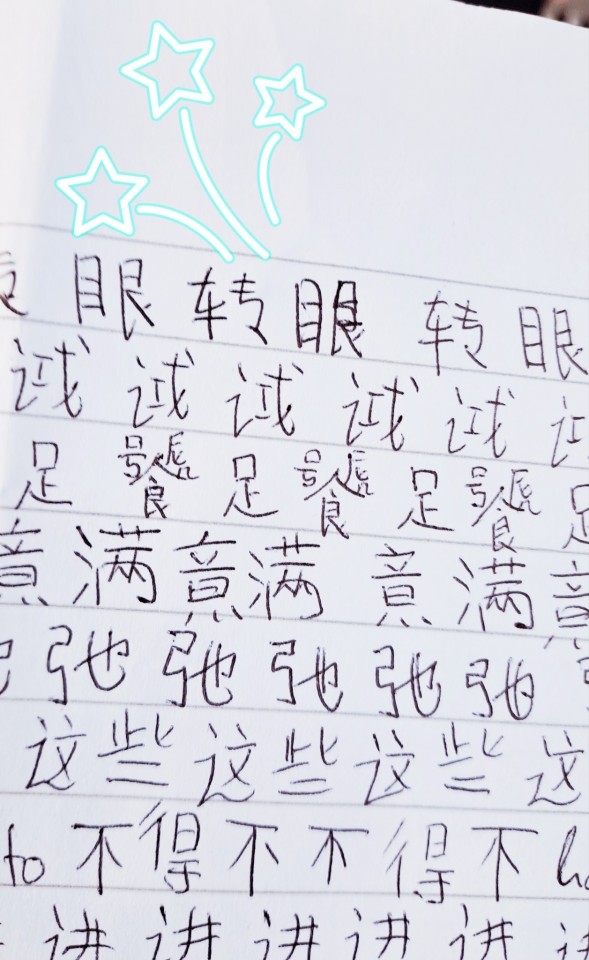
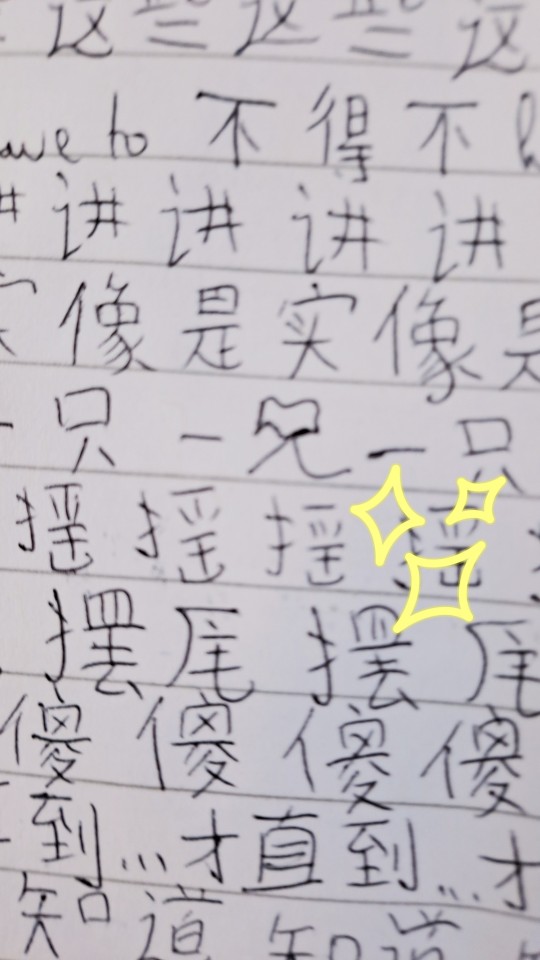
1 note
·
View note
Text
Part 9 Reading erha 二哈和他的白猫师尊 + learning Chinese
🏯🌿 Good afternoon 🌱🏯
I did quite a lot of new words to get through this paragraph, so buckle up! Also I will not post tomorrow to learn all this- I know it's not much but the terms are quite advanced and my brain is slow ok, anyways enjoy this artwork which I set as my homescreen- it's so beautiful
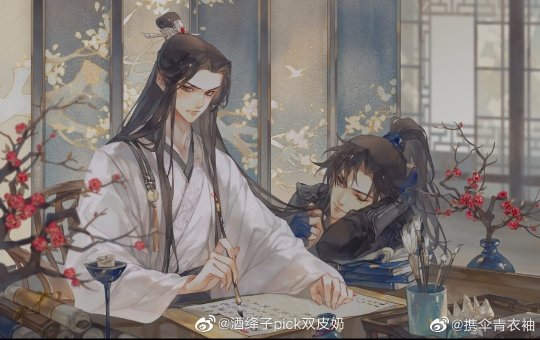
(this is official art and cr to the owner @ 携伞青衣袖)
BOOK TAGS: Xianxia, Rebirth, Action, Conspiracy, Angst, 1?v1 HE
No warnings, it's a friendly paragraph :3
•───────•°•❀•°•───────•
(part 1) 那狗灰白相见,额上三簇火,有点像狼。但只有瓜那么大,长得也瓜头瓜脑的, 滚胖浑圆,(part 2)偏还觉得自己很威风,满大殿疯跑,几次想爬上高高的台阶,去看清那好整以暇坐在帝位上的人,但因腿实在太短,皆以失败告终。
Nonetheless, it still thought of itself rather mightily, running all over the great hall with abandon. Several times, it tried to climb the very, very high steps to see clearly that person who satupon the throne so composedly, but because it's legs were so short, it finally abandoned the endeavour.
•───────•°•❀•°•───────•
Vocabulary:
1. 偏 - stubbornly (or contrary to expectations) - piān
Grammar for 偏偏: indicates an unexpected outcome (idea, thought or action) contrary to expectations.
Structure: 1st clause establishes Scenario (A), + 偏偏 before or after 2nd clause (B)
B is the very thing the subject is talking about.
E.g. 不叫他去,他偏偏要去。Bù liào tā qū, tā piānpiān yào qù. He insists on going even though he was not asked to.
2. 觉得 - to think/ feel - juéde
3. 自己 - oneself/ self - zìjǐ
4. 威风 - mighty/ imposing - wēifēng
5. 满 - full/ filled - mǎn
6. 大殿 - hall (large hall) dàdiàn
7. 疯 - insane/ mad/ wild - fēng
疯跑 fēngpǎo means "to run wildly" or "to dash around."
8. 爬上 - to climb - pá
9. 台阶 - steps/ stairs - táijiē
10. 看清 - to see clearly - kàn qīng
11. 好整以暇 - describes someone who appears "composed and leisurely" - hǎo zhěng yǐ xiá
好 (good) 整 (complete) 以 (at) 暇 (leisure)
Idiom: to be calm and unruffled in the midst of chaos or at a busy time.
12. 帝位 - emperor's throne - dì wèi
13. 因 - because - yīn
Grammar:
a. To express cause and effect. 因为...所以... = Because... So...
b. To indicate Therefore. 因此 yinci 'because of this' is commonly used in normal writing to indicate consequence or conclusion.
14. 腿 - legs - tuǐ
15. 实在 - indeed/ truly - shí zài
16. 短 - short - duǎn
17. 皆以 - all (with)/ each to - jiē yǐ
18. 失败 - failure - shī bài
19. 告终 - to come to an end/ to conclude - gào zhōng
8 notes
·
View notes
Text
Part 8 Reading erha 二哈和他的白猫师尊 + learning Chinese
🕯️🏺 Salutations blog ⚱️🕯️
I climbed Sisheng Peak today where is Chu Wanning at?? HELLOO.. anyone THERE ? -There- - th e re- (echo) hm... Maybe he went on holiday?
Ok maybe I'll just translate till he is back ._.

(Wanning was actually gone on holiday)
TAGS: Xianxia, Rebirth, Action, Conspiracy, Angst, 1?v1 HE, NSFW
•───────•°•❀•°•───────•
(part 1) 那狗灰白相见,额上三簇火,有点像狼。但只有瓜那么大,长得也瓜头瓜脑的, 滚胖浑圆,(part 2)偏还觉得自己很威风,满大殿疯跑,几次想爬上高高的台阶,去看清那好整以暇坐在帝位上的人,但因腿实在太短,皆以失败告终。
The puppy had a coat of whitish grey, three slashes of flames upon its forehead, kind of like a wolf. But, it was only as big as a melon, and looked kind of stupid, chubby and round.
•───────•°•❀•°•───────•
Vocabulary:
1. 灰 - grey/ ash - huī
2. 白 - white - bái
3. 相见 - to meet/ to see each other - xiāng jiàn
Is used here to describe how the gray and white colors come together on the dog.
Includes character 相 (related to) from before.
4. 额 - forehead - é
5. 簇 - a bunch - cù
三簇火" (sān cù huǒ) means "three tufts of fur" but uses the metaphor of fire to describe their appearance.
6. 有点像 - a little bit like - yǒu diǎn xiàng
有点 means "a little" or "a bit" but when placed infront of an adjective , it gives a sense of dissatisfaction or negative impression from the speaker
像 - like/ such as/ appearance
狼 - wolf - láng 🐺
7. 只有 - only - zhǐ yǒu
8. 瓜 - melon - guā
9. 那么 - comparative structure ( for the size) - guā nàme
10. 长得 - to grow/ appear - zhǎng dé
11. 脑 - brain - nǎo
12. 滚 - to roll - gǔn
Describes the movement of the dog.
13. 胖 - chubby - pàng
Describes the dog's physical appearance.
14. 浑圆 - round - hún yuán
Emphasizes the shape of the dog wwww
Doggo I love you even if you're like a watermelon ok 🐕
Practice:
Wuayy I got some notes to show! Sorry they are so messy and probably in ugly handwriting but when I'm practicing memorising at 11pm I prioritise getting the character associated with the correct meaning so I forget to focus on the overall appearance :')
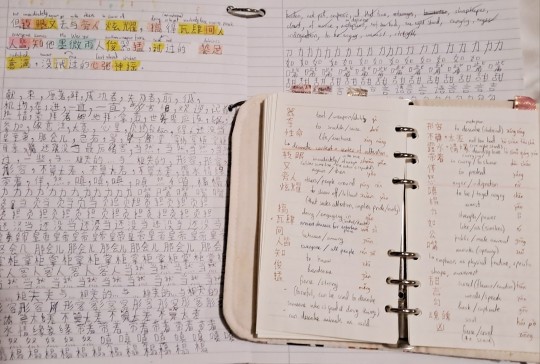
#chinese#erha#erha he ta de bai mao shizun#grammar#language#linguistics#mo ran#二哈#二哈和他的白猫师尊#chu wanning#fanart
1 note
·
View note
Text
Part 7 Reading erha 二哈和他的白猫师尊 + learning Chinese
🌾🌻 Hello hello blog 🌻🌾
I woke up too early.. no energy.. need a coffe with three sugars.. but oh wait there's a new sentence to translate let's gooo!
I'm thinking of making a downloadable pdf after every page is complete full of the overall notes just to make it easily viewable =w=
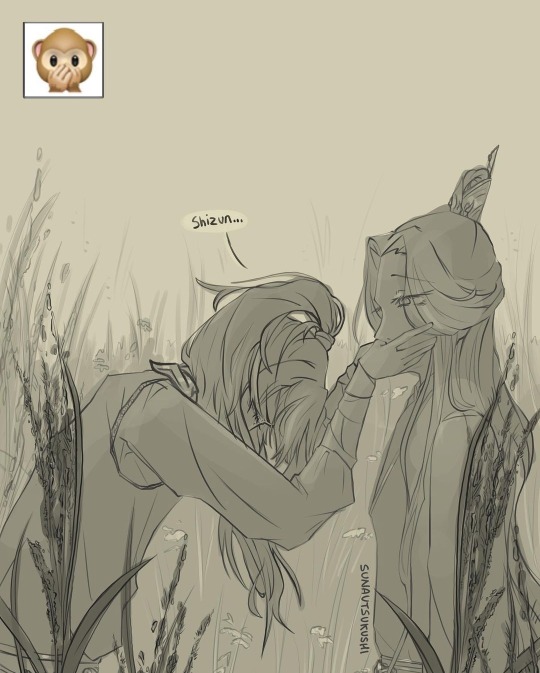
(Sorry all my RanWan art is from last year, I need to draw them again soon!!)
有一天,有个远疆的小仙门送了他一只奶狗。
TAGS: Xianxia, Rebirth, Action, Conspiracy, Angst, 1?v1 HE, NSFW
•───────•°•❀•°•───────•
One day, a small sect from a faraway land gifted him a puppy.
•───────•°•❀•°•───────•
VOCABULARY + grammar:
1. 远 - far/ distant - yuân
While 离 (lí) is one method of conveying distance, if you're not refering to a particular distance you can combine 离 with modifier 近 jìn, to signify "near" or 远 for “distant”.
2. 疆 - border/ boundary - jiāng
(疆土 is a territory)
3. 小仙门 - Xiaoxian Sect - xiǎo xiān mén
Refers to the Xiaoxian Sect, which seems to be a specific group or organization.
Small + immortal + gate
4. 送了 - gave/ presented - sòng le
What is the differenc between 送 and 献?
"送" is a more general term for gift giving or presenting something, often associated with generosity and goodwill. On the other hand, "献" has a more formal and ceremonial connotation, emphasizing respect and reverence in the act of presenting.
5. 奶狗 (nǎi gǒu) translates to "milk dog" or "puppy."
Sorry it's just a short one today, but tomorrow there will be a big paragraph. I will use this time to practice new words))
1 note
·
View note
Text
Part 6 Reading erha 二哈和他的白猫师尊 + learning Chinese
🏮🪭 hello blog 🪭🏮
I have noticed a rise in xianxia webtoons recently and I am very happy about this. Although it makes me lose sleep, it is worth the read. Some of my favourites recently are Best Teacher Baek and Reincarnated as an Unruly Heir. Sadly both only have 70 ISH chapters average and I can read that in like... Two days......
In my sadness of finishing both up to date, I will continue my translations of ErHa.
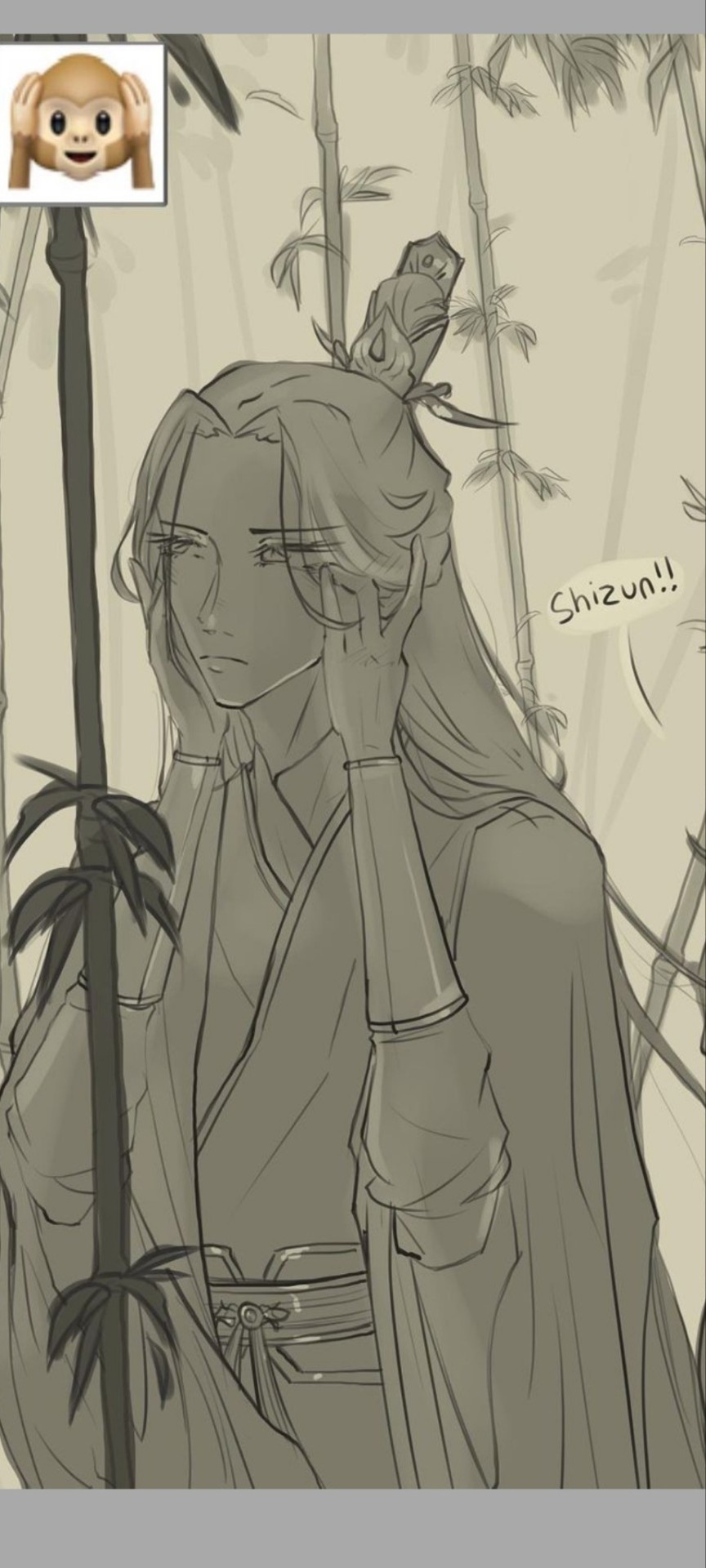
Another old sketch I did last year.
直到他当上修真界的帝王,这类称呼才骤然间消散不见。
TAGS: Xianxia, Rebirth, Action, Conspiracy, Angst, 1?v1 HE, NSFW
· · ─────── ·𖥸· ─────── · ·
It wasn’t until he became the emperor of the cultivation world that these kinds of monikers disappeared in a flash.
· · ─────── ·𖥸· ─────── · ·
VOCABULARY + grammar:
1. 直到... - until - zhídào
才... - did something happen - cái
A) 直到 (zhídào) is describing a time period that happened in the past and persisted until a moment nearer to the present. It's like the expression "all the way until." It can be used in both positive and negative forms, showing that something has taken a considerable amount of time or is tardy. The word 才 (cái) is commonly used with 直到 to intensify the tardiness factor.
B) When using 才 in the affirmative form, it might be more natural in English to convey "something happened only after/when" rather than "until... did."
E.g. 直到十二点半,我才做完作业。
I didn't finish my homework until half past twelve. (Zhídào shí'èr diǎn bàn, wǒ cái zuò wán zuòyè.)
2. 当上 - to become/ to assume a position or status - dāng shàng
3. 修真界 - the cultivation world or the realm of cultivation - xiū zhēn jiè
Specifically refers to the practice of cultivating or refining one's inner and outer self, often associated with martial arts, magic, and spiritual enlightenment.
In the context of novels or stories, 修真界 often portrays a hierarchical society with various sects, schools, and clans, each with their own unique cultivation techniques, powers, and traditions.
4. 帝王 - emperor/ king - dì wáng
It refers to someone who holds the highest position of power and authority in a given context.
What is the difference between 帝王 and 皇帝?
"帝王" (dì wáng) is a broader term that encompasses the concept of an emperor or a king. It refers to a supreme ruler who holds absolute power and authority over a kingdom or an empire. It can be used in a more general or poetic sense to describe a powerful ruler with great influence and control.
On the other hand, "皇帝" (huáng dì) specifically refers to an emperor in the context of imperial China. It is a more specific and formal term used to denote the highest-ranking monarch in the imperial hierarchy. The term "皇帝" carries a stronger connotation of imperial authority and signifies a ruler who is considered divine or semi-divine, as the emperor was often regarded as the Son of Heaven in traditional Chinese ideology.
5. 类 - this type of/ this kind (category or class) - lèi
6. 呼 - to call/ to refer to - hū
In this sentence, it is describing a situation where a specific type of address (the monikers) or title abruptly disappears.
7. 骤然 - abruptly/ suddenly - zhòu rán
8. 消散 - to dissipate/ to vanish - xiāo sàn
9. 不见 - not seeing/ disappearance - bù jiàn
5 notes
·
View notes
Text
Part 5 Reading erha 二哈和他的白猫师尊 + Learning Chinese
🌟✨Good afternoon blog✨🌟
This isn't really related to my translations but I rewatched svsss and those two men have been replaying in my mind on loop. You know what other men are there? Mo Ran. Why are there so many danmei guys in existence???
Sorry, I will now get back on track and continue translating the text~ I took a day break to practice the new list of characters and also to figure out some words that I didn't understand before, like Google said before that 瓦肆 is a tile shop?? So I asked Reddit for some help. They dissed me on my book choice but oh well- the actual meaning is that in ancient Chinese this word is to describe a place of entertainment (such as a bar, brothel or a theatre).

(A Chu Wanning lollypop I made... Would anyone like a bite?)
不得不说,这些人讲的很对,墨燃确实像是一只摇头摆尾的傻狗。
TAGS: Xianxia, Rebirth, Action, Conspiracy, Angst, 1?v1 HE, NSFW
•───────•°•❀•°•───────•
It had to be said that those names were very spot on. Mo Ran was indeed very much like a tail-wagging dumb dog.
•───────•°•❀•°•───────•
1. 不得不 - have to - bùdébù
2. why in 这些 the 些 doesn't mean 'a few'?
In the phrase "这些," the character "些" is not used to indicate "a few." Instead, it is a measure word used to quantify and classify the noun "这" (which means "these" or "this"). Measure words in Chinese are commonly used to indicate the quantity of a noun or provide additional information about the noun's shape, size, or usage. In this case, "这些" means "these" or "this" (referring to plural objects or a group of objects).
3. 讲 - to speak/ to talk - jiǎng
(it's not the same as 进!which took me a while to realise)
It is used here to indicate that "these people" are speaking or talking about something.
4. 对 - correct/right - duì
5. 实像是 - appears to be/ seems like - shí xiàng shì
(实 Definitely + 像 appearance) It is used to describe the resemblance or appearance of Mo Ran.
6. 一只 - measure word for animals (a/ one) - yī zhī)
7. 摇 - to shake - yáo
8. 摆尾 - tail wagging - bǎi wěi)
(a pendulum + animal tail)
9. 傻 - foolish - shǎ
傻狗 (shǎ gǒu) - This term means "silly dog" or "stupid dog."
I will keep practicing some notes in the background!
5 notes
·
View notes
Text
Part 4 Reading erha 二哈和他的白猫师尊 + Learning Chinese
🌳🎋Hello blog~🌳🌲
I'm going on a flight today but I can always fit in some more of the translations)) I have decided that from last night's practice my new favourite thing to write is 露水情緣. Excuse the definition but it's such a pretty character and the idea behind the meaning is so poetic~
Anyways, I will finish the paragraph today!

(an old sketch I drew last year)
The following sentences don’t have anything graphic but do include a few innuendos, so watch out!
TAGS: Xianxia, Rebirth, Action, Conspiracy, Angst, 1?v1 HE, NSFW
· · ─────── ·𖥸· ─────── · ·
TAGS: Xianxia, Rebirth, Action, Conspiracy, Angst, 1?v1 HE, NSFW
WARNINGS: still talking about 🍆 inuendos
•───────•°•❀•°•───────•
(part 1) 当然,总也有过一些与狗相关的形容,不算太差。比如他那些露水情缘,总是带着几分佯怒,(part 2) 嗔他在榻上腰力如公狗,嘴上甜言勾了人的魂魄,身下凶器夺了卿卿性命,(part 3) 但转眼又去与旁人炫耀,搞得瓦肆间人 人皆知他墨微雨人俊器猛,试过的饕足意满,没试过的心弛神摇。
But, they'd turn around and boast to others afterwards, so much so that the entire district knew that the man Mo Weiyu was both handsome in looks and aggressive in tool; those who tried were satisfied with their meal, and those who hadn't were dearly tempted.
•───────•°•❀•°•───────•
Here's the text with me writing as much as I already know into it:
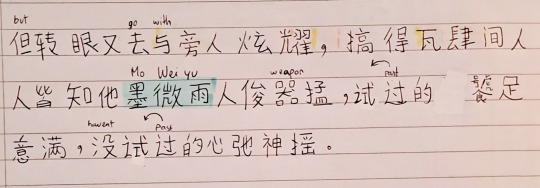
VOCABULARY + grammar:
墨微雨 is Mo Weiyu who is also known as Mo Ran.
1.转眼 - immidiately, in a blink of an eye - huǎn yǎn
Idiom: 转眼便忘
What the eye doesn't see the heart doesn't miss.
2. 又 - again/ then (repeat an action again after some time) - yòu
For dual qualities: 又 can be used to say the phrase "you have both A and B."
E.g. 她男朋友又高又帅。
Her boyfriend is tall and handsome.
3. 旁人 - others/ people around - páng rén
This noun refers to other people who are not directly involved in the action being discussed.
4. 炫耀 - to show off/ to flaunt - xuàn yào
The act of showcasing one's achievements, possessions, or abilities in a way that seeks attention or admiration. It implies a certain level of pride or vanity.
5. 搞 - doing/ engaging in - gǎo
6. 瓦肆 - tile shop/ marketplace - wǎ sì
7. 间 - between/ among - jiān
This phrase translates to "people in the tile market." It seems to refer to ordinary people in a marketplace setting.
8. 人皆 - everyone/ all people - rén jiē
9. 知 - to know - zhī
10. 俊 - handsome - jùn
11. 猛 - fierce/ strong - měng
What's the difference between 凶 and 猛?
凶:It can describe the people you are afraid of.
猛:a.It describes a person who is very good at doing things.
b.It can describe animals as wild.
12. 试 - to try - shì
13. 饕足 - delicious food/ gourmet - tāo zú
In the context of satisfying one's taste buds.
14. 意满 - satisfied/ content - yì mǎn
15. 没试过的心弛神摇"! This phrase is in Chinese and it roughly translates to "A heart that has never been tested is easily shaken."
Finally, some notes:
I don't have special paper so until I buy some I will just draw squares lol
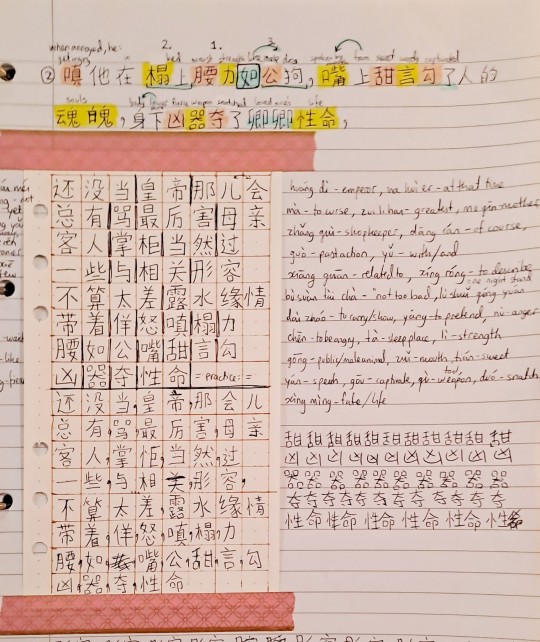
18 notes
·
View notes
Text
Part 3 Reading erha 二哈和他的白猫师尊 + Learning Chinese
🎵🍇Good morning!🍇🎶
I would like to thank everyone who liked my previous post and who gave tips on how to improve! It's really motivating =w=
Also thanks to my friend who taught me how to use Tumblr, it's my first time here lol
For anyone new, or those who are unfamiliar with the book I am going through, I have to warn you some scenes are very dark and have NSFW themes. I didn't just choose a bit of angst or a bit of kissing, no this book goes straight to 100 and beyond 🚀 if you don't like that please keep scrolling. The MC is a tyrannical ass wipe who has 311 chapters of redemption ok. This was one of the few books to make me cry where the story and characters are so beautifully written that I am happy to translate everything. We must get through the tough times to enjoy the real romance 🥰
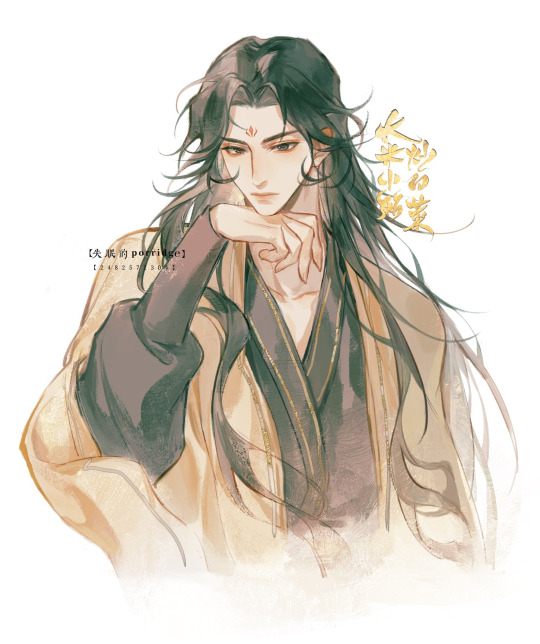
(art 大米小粥炒白菜 @porridge2_ on Twitter)
· · ─────── ·𖥸· ─────── · ·
The following sentences don't have anything graphic but do include a few innuendos, so watch out!
TAGS: Xianxia, Rebirth, Action, Conspiracy, Angst, 1?v1 HE, NSFW
WARNINGS: Dubcon, Underage Sex
•─────────•°•❀•°•─────────•
(part 1) 当然,总也有过一些与狗相关的形容,不算太差。比如他那些露水情缘,总是带着几分佯怒,(part 2) 嗔他在榻上腰力如公狗,嘴上甜言勾了人的魂魄,身下凶器夺了卿卿性命,(part 3) 但转眼又去与旁人炫耀,搞得瓦肆间人人皆知他墨微雨人俊器猛,试过的饕足意满,没试过的心弛神摇。
…that the strength of his back was like that of a male dog; honey dripped from his lips luring away the soul, but the weapon down below was robbing the sweetness of her life.
•─────────•°•❀•°•─────────•
VOCABULARY + grammar:
1. 嗔 - to be/get angry - chēn
It sounds similar to the English word "churn". 嗔 is commonly used to express mild or moderate anger. It's not an extremely strong or aggressive term for anger. You might use it in casual conversations to express frustration or annoyance.
2. 榻 - a place where someone rests or sleeps (bed/couch)- tà
3. 腰 - waist - yāo
It refers to the lower part of the back and the area around the waist.
4. 力 - strength/power - lì
Often used in compound words related to strength, power or ability.
5. 如 - like/ as - rú
如 is commonly used to create similes or comparisons. It helps draw parallels between two things or concepts.
如 + 同/像 tóng/xiàng + Subject of Comparison + (Adjective/Verb/Description)
e.g. 如同 + 清晨的鸟鸣… "Like the morning birdsong…"
Note that 如 can also be used without 同/像 to indicate a comparison, but including them helps make the comparison more explicit.
比如 - for example - bǐ rú (same as 例如 lìrú)
如同 - as - rú tóng
6. 公 - public/ common/ male animal (this case) - gōng
7. 嘴 - mouth (opening) - zuǐ
Why use 嘴 instead of 口?
嘴 emphasise + focus on mouth as a physical feature, more specific shape, movement e.g. 嘴唇 (zuǐ chún): Lips, 嘴角 (zuǐ jiǎo): Corners of the mouth
嘴 commonly used when discussing emotions, expressions e.g. 嘴上甜言 (sweet words spoken by mouth), 嘴硬 (stubborn in speech)
口 is more general, commonly used for speaking, eating, drinking, or breathing + used when counting people (e.g., 三口人, "three people").
8. 甜 - sweet (flavour/ emotions) - tián
9. 言 - words/speech - yán
10. 勾 - hook/ captivate - gōu
11. 魂魄 - soul + spirit - hún pò
灵魂 (líng hún): This is a more commonly used term for "soul" in everyday language.
12. 凶 - fierce/ cruel - xiōng
13 器 - tool/ weapon - qì 🌭
14. 夺 - to snatch/ to seize - duó
15.卿卿 - poetic way to address - qīng qīng
Used to refer to a beloved or a person of affection. It's a way of expressing deep emotional attachment and love.
16. 性命 - life/ existence - xìng mìng
Used in more serious or dramatic contexts where the concept of life and its fundamental nature is being emphasized. In this sentence, the life is the center of attention.
OVERALL NOTES:
I was told it would be good to invest in a special book with squares so I can write my characters more correctly, so I will try to get that soon (delivery might take a while though so you will have to bear with me for now).

I got so happy because yesterday I was scrolling through Instagram and someone reposted some screenshots of Heaven's Official Blessing manhua and I understood some new words from just reading 2 sentences from this book!? exciting stuff :D
3 notes
·
View notes
Text
Part 2 Reading erha 二哈和他的白猫师尊 + learning Chinese
🌿🎍I'm back and excited to continue! 🎍🌿
It's been a while since I was motivated to learn Chinese but in summer I went to Japan. Hold on, there is a connection here I swear. I spent a few months before the trip learning Japanese in hopes of being able to get around more easily, however, the more I studied, the more I realised... This language is harder than Chinese?!? And I really missed knowing the basics of a language (plus re-learning characters I already knew however now had a new meaning and pronunciation was very sad). So I am back and more excited than ever, no matter how difficult this novel is I will take it slowly day by day, and hopefully speed up eventually.

*Chinese book cover*
Maybe I can even reach the second book in the series, and after that just read every Danmei novel in the original text +_+
· · ─────── ·𖥸· ─────── · ·
We continue the translation of paragraph 3. Note: I am going to cut the sentence into a few days because there are too many commas and not enough full stops lol.
TAGS: Xianxia, Rebirth, Action, Conspiracy, Angst, 1?v1 HE, NSFW
WARNINGS: Sexual innuendos 🌭
•─────────•°•❀•°•─────────•
(part 1) 当然,总也有过一些与狗相关的形容,不算太差。比如他那些露水情缘,总是带着几分佯怒,(part 2) 嗔他在榻上腰力如公狗,嘴上甜言勾了人的魂魄,身下凶器夺了卿卿性命,(part 3) 但转眼又去与旁人炫耀,搞得瓦肆间人人皆知他墨微雨人俊器猛,试过的饕足意满,没试过的心弛神摇。
Of course, there were other dog-related metaphors that weren't too bad. For example, his one-night stands would always grumble with some petulance...
•─────────•°•❀•°•─────────•
VOCABULARY + grammar:
1. 当然 - of course/certainly - dāng rán
- To say “yes” to somebody’s question. (e.g. dāng rán! 当然! Of course you can!)
- As it is supposed to be; sth. is reasonable.
- An informal expression for making contrasts; used at the beginning of a sentence. In this situation, “当然” affirms the obvious fact. (e.g. 当然了,人不是... Of course, no one can...)
*In most cases, “当然” and “一定[yí dìng]” both can be used to affirm a situation. However, the two cannot replace each other in a sentence without a change of meaning.
1.5 一定 — yí dìng
- Used to promise sb sth. (e.g. 甲:明天来我家吃饭啊?A: Come to my place tomorrow, will you? 乙:一定一定。B: Sure I will)
- Strongly hope sth will happen; its negative form indicates sth is a not-so-positive estimation. (e.g. 甲:我儿子明年一定考上大学。 A: My son will be admitted into a university next year for sure. 乙:那可不一定。B: You can’t be so sure.)
- To emphasize; must (e.g. 他一定要回去休息。He must go home and get some rest.)
2. 过 - indicates a past action - guò
Used to talk about past experiences or past actions in Chinese grammar. It is placed immediately after the verb to indicate that that verb was done or experienced in the past.
3. 一些 - some/a few - yìxiē
一些 + Noun
4. 与 - with/ and - yǔ
与 + Topic + 相关的 + Noun(formal)
When you need to express one thing in relation to another.
What is the difference between 和, 与, 跟? (when all mean 'and')
和 hé is more general and informal (e.g. big and small: 大和小). 与 yǔ is more formal and used in written chinese (e.g. father and son: 父与子). It is not not normally used in day-to-day speech. 跟 gēn is commonly used with people and carries the meaning of “to follow” or “to go with” (e.g. Bob and mary went: Bob跟Mary去)
4.5 相关 - related to/ correlation - xiāng guān
But I will practice the informal version:
跟 / 和 + Topic + 有关的 + Noun
5. 形容 - to describe(with a rhetoric)/description - xíng róng
e.g. A: "he runs very fast" can use 描述miáo shù(describe literally) this man runs very fast.B: "he runs like a rabbit" can use 形容 (metaphorically) this man runs very fast.
6. 不算+太差 - "not too bad" - bù suàn tài chà
(不算 not considered/ not regarded as + 太差 too bad/ too inferior)
It is often used to describe something that is not excellent but also not terrible, meaning it is relatively acceptable or satisfactory.
7. 露水+情缘 - (dewdrop love)one night stand - lù shuǐ qíng yuán
It captures the idea that much like dewdrops, love vanishes with the rising sun.
8. 带着 - carry + to show/ to display - dài zháo
This means "with" or "carrying". It indicates that someone has a certain emotion or expression while doing something.
露水dew drop + 情缘emotional bond/ fateful connection
9. 几分 - a few + points/ to some extent - jǐ fēn
10. 佯 - to pretend - yáng
11. 怒 - anger/ indignation - nù
着几分佯怒 (zháo jǐ fēn yáng nù) can be roughly translated as "showing a bit of feigned anger" or "pretending to be somewhat angry."
I will not learn the whole phrase, but just know it exists. I only want to learn the individual words to be able to recognise them in text.
OVERALL NOTES:

I also practiced my writing:
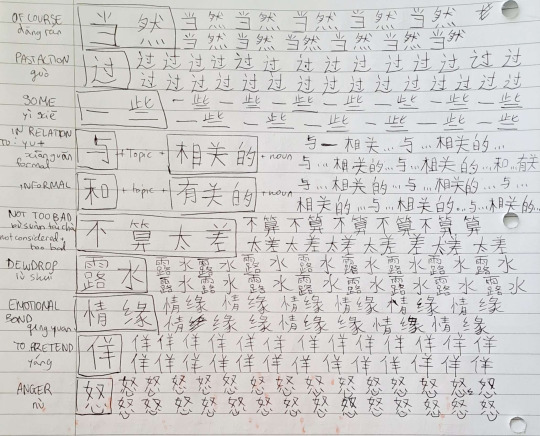
0 notes
Text
Part 1 Reading Husky and his White Cat Teacher 二哈和他的白猫师尊 + learning Chinese
Hello new blog!! I'm going to start 🌸fresh 鲜 🌸
Ok. I have read this book in English before, and I know absolutely NO ONE in the history of ever has tried learning Chinese through this book. I already have some experience (up to HSK3 lmao 🐣) but I'm determined. Fight me I'm doing it. ¯\_( ͡° ͜ʖ ͡°)_/¯
How I decided on this was a few years back I wanted to read Husky and His White Cat Teacher 二哈和他的白毛师尊 but it was all fan translated. After a certain point, the fan translators wanted me to support the author, so I bought the original Chinese copy and sent them a picture as proof of support, then I got the document of the translation to continue reading. I sobbed so hard and felt so many more feelings than ever before, and despite the dark side of the book, it became my favorite instantly. Now I bought the official translated book and am excited to collect them all like Pokémon.

*book cover -why are they so beautiful pls my heart-*
However, I still have that one Chinese book, and I'm an impatient b!tch so I decided to read it in the meantime. Except I don't want just a translation, I want to READ and UNDERSTAND ok. Grab your pen and tea, here we go 🍵
· · ─────── ·𖥸· ─────── · ·
Here goes the translation for the first two sentences of the book. If i got anything wrong or you'd like to add something, please comment!!
TAGS: Xianxia, Rebirth, Action, Conspiracy, Angst, 1?v1 HE, NSFW
WARNINGS: Swearing
•─────────•°•❀•°•─────────•
墨燃还没当皇帝的那会儿,总有人骂他是狗。
掌柜骂他狗儿子,客人骂他狗崽子,堂弟骂他狗东西,他母亲最厉害,骂他狗娘养的。
Before Mo Ran became emperor, people always called him a dog.
The manager called him a 'son of a bitch', the customers called him a 'bitch pup', his little cousin called him a 'shitty dog', and his mother was the best, saying he was raised by a bitch.
•─────────•°•❀•°•─────────•
VOCABULARY + grammar:
🐶墨燃 Mo Ran is the name of the main character of the novel.
1. 还没当 - not yet - Hái méi dāng
还有 - also; furthermore; in addition - Hǎi yǒu
还是 - had better; nevertheless - Hǎi shì
还好 - furthermore; not bad - Hǎi hǎo
2. 皇帝 - emperor - Huángdì
Idiom:
皇帝不急太监急 - Huángdì bù jí tàijiàn jí
fig. The observers are more anxious than the person involved.
lit. The emperor is not worried, but his eunuchs are.
3. 那会儿 - at that time - Nà huì er
那 - that (e.g. 看那 Will you look at that?)
When you are thinking of something, in English you would say 'uhm' or 'uhhh', while in Chinese the equivalent term would be 那个 (nàgè).
这 zhè/ 那 nà + Measure Word + Noun
4. 总有 - always/ inevitably there will be - Zǒng yǒu
5. 骂 - to curse/ to shout abuses - mà
6. 掌柜 - shopkeeper - Zhǎngguì
7. 客人 - client/customer - Kèrén
8. 母亲 - mother - Mǔqīn
9. 最厉害 - great (-est, both positive and negative) - Zuì lìhài
It is somewhat similar in usage to the word 'great' in English, with the following meanings:
Impressive or skilled: 他的功夫非常厉害。= He is very skilled in martial arts. 太厉害了,他是怎么做到的? = Very impressive, how did he manage to achieve that?
formidable: 厉害的角色 = A formidable figure (not one to be messed around with). 厉害的手段 = formidable tactics (in a sporting game, or as part of political intrigue)
severe: 某某股跌得太厉害了 = Stock X has taken a severe fall (in value)
厉害 can also mean a few things when describing a person and relies heavily on the context. For example the sentence:
他是很厉害
Has numerous possibilities and it would be wrong to assume something without further explanation.
Some examples:
This person is very strict or harsh
This person has a sharp personality
This person is very skillful/capable
The same with the use of 太厉害. This could have a positive or negative connotation. It could describe someone who is amazingly skillful or someone that is overly strict.
10. Multiple ways to say 'son of a bitch':
狗儿子 - (Dog's son) Gǒu érzi
狗崽子 - (son of dog) gǒu zǎizi
狗东西 - (dog thing) gǒu dōngxī
狗娘养的 - (lit. "raised by a dog mother") gǒu niáng yǎng de
The fact that many insults are prefaced with the Mandarin Chinese word for dog attests to the animal's low status.
•─────────•°•❀•°•─────────•
PRACTICING:
Some of my notes are mixed in with previous practices.
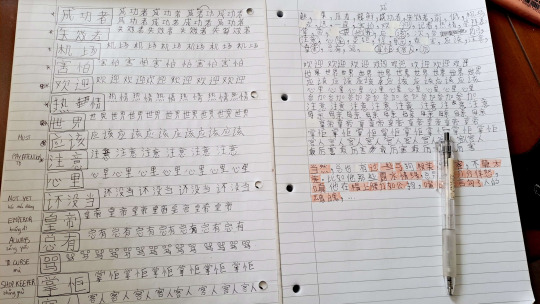
40 notes
·
View notes